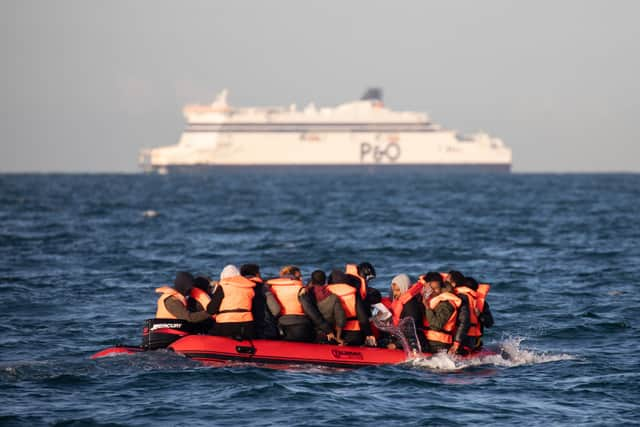Rwanda High Court legal challenge: what was verdict on UK government’s asylum seeker deportation policy?
and live on Freeview channel 276
The UK government’s controversial plans to deport asylum seekers to Rwanda have been ruled lawful by the High Court.
Judges announced on Monday (19 December) that the Home Office has won a legal challenge against its policy to send migrants deemed to have arrived in the UK ‘illegally’ to the nation in east Africa. The deal was initially struck in April by then-Home Secretary Priti Patel, as part of Home Office attempts to deter migrants from crossing the Channel.
Advertisement
Hide AdAdvertisement
Hide AdBut the “world-first agreement” has faced a series of setbacks from the outset, with the first flight, which was due to take off in June, grounded following an intervention from the European Court of Human Rights. Several asylum seekers, along with the Public and Commercial Services union (PCS) and human rights groups Care4Calais and Detention Action, also subsequently brought legal challenges against the deportation policy - arguing that Rwanda was not safe for migrants and refugees.
Lawyers told the High Court that the country is an “authoritarian state” that “tortures and murders those it considers to be its opponents”, with the UN Refugee Agency adding that sending asylum seekers there would lead to serious breaches of the Refugee Convention.
However, their arguments proved unsuccessful as the two judges presiding over the case ruled that the plans were “lawful”. In a summary of the decision, Lord Justice Lewis said: “The court has concluded that it is lawful for the government to make arrangements for relocating asylum seekers to Rwanda and for their asylum claims to be determined in Rwanda rather than in the United Kingdom.”


He added: “The relocation of asylum seekers to Rwanda is consistent with the Refugee Convention and with the statutory and other legal obligations on the government, including the obligations imposed by the Human Rights Act 1998.”
Advertisement
Hide AdAdvertisement
Hide AdThe government was not entirely successful in the case however, as Lord Justice Lewis ruled that the cases of the eight individual asylum seekers who mounted challenges “had not been properly considered” by the Home Office. This means the decisions to send them to Rwanda will be quashed and sent back to be reconsidered.
It is also expected that the ruling will be challenged in the Court of Appeal, with a Supreme Court battle also possible, blocking flights until next year at the earliest.
The news will likely be welcomed by Prime Minister Rishi Sunak who recently announced he hopes to restart the flights to Rwanda as part of his new strategy to clamp down on illegal migration. Meanwhile, Home Secretary Suella Braverman, who previously described the prospect of seeing a flight take off for Rwanda as her “dream” scenario, has commented: “We have always maintained that this policy is lawful and today the court has upheld this.”
Elsewhere, charities and groups supporting the legal challenge have voiced their “disappointment” at the outcome.
Advertisement
Hide AdAdvertisement
Hide AdClare Moseley, founder of charity Care4Calais, said while the charity is “relieved for the individual claimants whom the court has ruled should not be removed to Rwanda”, there are still “potentially thousands more people seeking asylum in the UK who are, right now and in the future, potentially facing the threat of removal to Rwanda under this cruel and unworkable policy.”
She continued: “It is for all of them that we made this challenge and for them we must continue to pursue it. The Rwanda plan won’t end small boat crossings and it won’t keep refugees safe. There is a kinder and more effective way; giving safe passage to refugees in Calais.”


Enver Solomon, chief executive of the Refugee Council, added: “We are very disappointed in the outcome of this case. If the government moves ahead with these harmful plans, it would damage the UK’s reputation as a country that values human rights, and undermine our commitment to provide safety to those fleeing conflict and oppression, as enshrined in the 1951 Refugee Convention.
“Treating people who are in search of safety like human cargo and shipping them off to another country is a cruel policy that will cause great human suffering. The scheme is wrong in principle and unworkable in practice. The possibility of being sent off to Rwanda is causing huge distress to those we work with, including young people who are becoming extremely anxious and in some cases self-harming.”
Advertisement
Hide AdAdvertisement
Hide AdHe also argued that the Home Office’s “own evidence” shows that “hugely expensive” deterrence measures such as the Rwanda policy “simply do not work” - adding that the government should instead be focusing on “operating an orderly, humane and fair asylum system, and developing safe routes such as humanitarian visas.”
Other critics include the Labour Party, which has slammed the Rwanda asylum seeker scheme as “unworkable” and “unethical”, and described it as a “damaging distraction from the “urgent action the government should be taking to go after the criminal gangs and sort out the asylum system.”
Shadow Home Secretary Yvette Cooper said: “Ministers have already written a £140m cheque to Rwanda without the policy even starting, with millions more promised even though Home Office officials say there’s no evidence it’ll provide a deterrent and it risks making trafficking worse.” She also claimed Rwanda’s government has said it can only process 200 people a year, which amounts to just 0.5% of Channel crossings this year.
Meanwhile, the Law Society has said following the ruling that proper access to justice for any person considered for removal to Rwanda must remain paramount in Home Office decision-making moving forwards. President Lubna Shuja said: “This policy has far-reaching consequences for those affected and it is absolutely vital each case is properly considered on its facts, as is made clear in today’s judgment. Legal challenges ensure government accountability, and court judgments provide clarity and independent scrutiny of state decisions.”
Advertisement
Hide AdAdvertisement
Hide AdSpeaking on the likelihood of the decision being taken to the Court of Appeal, Ms Shuja continued: “Whatever the final outcome, we hope the government will commit to taking a measured approach and continue to review its obligations under international and domestic law. Our members – solicitors in all areas of law – will be watching carefully to see that access to justice and the rule of law are preserved in whatever steps the government takes next.”


The government is currently facing growing pressure from MPs and the public to deal with new migrant arrivals, as figures suggest that more than 40,000 - a record number - have crossed the English Channel just this year. It is looking to strike deals similar to that with Rwanda with other countries, deporting all those who arrive in the UK by unauthorised routes.
Critics maintain however that there are few authorised routes for seeking asylum in the UK, other than those set up for people from Ukraine, Afghanistan and Hong Kong.
Comment Guidelines
National World encourages reader discussion on our stories. User feedback, insights and back-and-forth exchanges add a rich layer of context to reporting. Please review our Community Guidelines before commenting.
